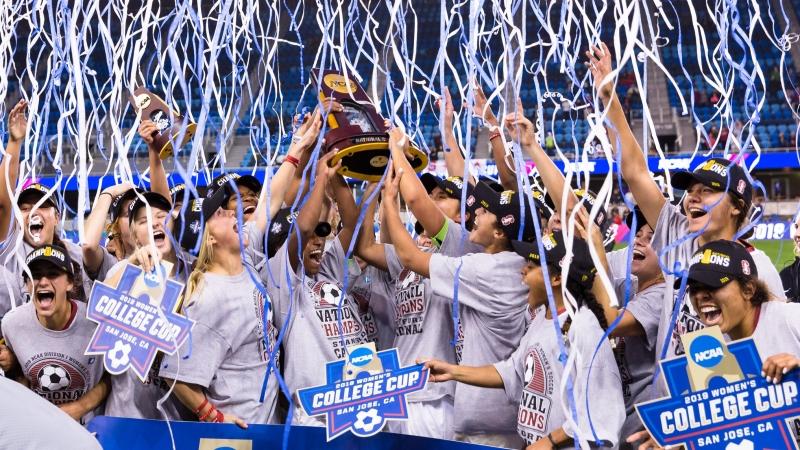DECEMBER 9, 2019
SAN JOSE, Calif. – Two saves by goalkeeper Katie Meyer and a decisive strike by Kiki Pickett gave Stanford its third NCAA women’s soccer championship, beating North Carolina on penalty kicks, 5-4, after the teams drew 0-0 before 9,591 at Avaya Stadium on Sunday.
After 110 minutes of play – including two 10-minute overtime periods – a fiercely even and hard-fought final came down to a shootout.
Meyer set the tone with a two-handed diving save in the first round. After North Carolina goalkeeper Claudia Dickey made a save of her own, even the shootout went into sudden death after the teams remained deadlocked at 4-4.
That’s when Meyer came up big again. Meyer, who made a momentum-changing penalty-kick save in Stanford’s 4-1 semifinal victory over UCLA on Friday, dived to her left to block a shot by North Carolina’s Tori Hansen, who hadn’t played in the match. The ball deflected off Meyer’s left knee.
Now, with Stanford needing only to convert a single shot to win the national championship, defender Kiki Pickett stuck the winner into the net, leaped several times into the air and then ran and slid into a wall of ecstatic teammates. Other Cardinal ran straight toward Meyer, as they all bounced up and down in triumph.
It was Stanford’s second title in three years and first victory over the Tar Heels in three tries at the College Cup, getting even for a 1-0 loss in the 2009 final.
Stanford completed its season at 24-1, to UNC’s 24-2-1. Stanford’s successful penalty kicks came in this order: Catarina Macario, Sophia Smith, Naomi Girma, Kennedy Wesley, and Pickett.
The soccer title was Stanford’s second of the day, following the men’s water polo triumph in Stockton in the afternoon.
Some facts about Stanford’s NCAA titles:
- Stanford has won 125 NCAA championships (67 men, 58 women) and 151 national championships overall.
- Stanford has won at least one NCAA championship during each of the last 44 academic years, dating back to 1976-77.
- Since 2000, Stanford has captured 49 NCAA championships and 64 national championships overall.
- Of Stanford’s NCAA team championships, 34 have been won in the fall, 28 in the winter and 63 in the spring.
- Stanford has won at least one fall NCAA title in each of the past five years.
Despite a sluggish first half, Stanford rebounded to outshoot North Carolina, 21-12, and had 14 corner kicks to UNC’s 3. But it wasn’t until the second overtime period that Stanford had great chances to score.
Carly Malaskey had a superb chance for Stanford. Madison Haley brought the ball up the left flank and crossed over to the center, setting up a diagonal pass that Malaskey reached on the run. A couple of touches later, she released a shot to the far post that was just nudged away by the fingertips of Dickey at 107:30.
Nearly a minute later, Macario’s corner kick from the left was flicked to the back post by the head of Haley, and into the path of Smith. The sophomore first-timed a right-footed shot that slammed against the crossbar.
On the other end of the frantic end-to-end play, Stanford centerback Girma twice blocked a one-on-one shot in the box.
The championship was the third for 17th–year coach Paul Ratcliffe, Stanford’s Knowles Family Director of Women’s Soccer.
For most of the first half, Stanford was unable to get the ball over the midfield stripe. UNC played a pressure defense that clogged the middle and forced Stanford to clear the ball rather than connect.
Macario was forced into a defensive midfield role, as Stanford required extra bodies to get the ball out. Haley, Stanford’s holding forward, never got the chance to do her job. On rare occasion when she got possession in the Tar Heels’ zone, she was surrounded by three defenders and desperately made a back pass to no one.
Macario was marked tightly, but one time in the half she did get free, throwing the defense into disarray. UNC ended up knocking the ball into a teammate and over the end line for a corner kick on that sequence. Nothing came of it, but Stanford took six first-half corner kicks, but still was outshot, 6-1, in the opening half.
Stanford’s best chance in the opening 45 minutes was a seventh-minute shot by Smith, who would be named as the College Cup’s Most Outstanding Player, off a goalmouth scramble that was blocked.
Stanford made a concerted effort to give Macario more possession in the second half and made adjustments to do so. On one sequence, she drove to the end line just right of the goal, but her centering pass was didn’t have a chance with five defenders in the way.
Midway through the second half, Macario, pivoted around three defenders, only to be met by Dickey at the near post, ending her run.
Meanwhile, North Carolina had two excellent chances. A steal and long run up the left flank in space led to a cross that tipped the knee of the Tar Heels’ Alessia Russo in front of an open goal. Later, a long free kick into the box was met with a bad touch in an otherwise open scoring opportunity.
As the match wore on, it seemed as if the smallest lapse would decide the otherwise even stalemate. Stanford came close when a deep pass from the right back Pickett found the head of Haley, who beat the goalkeeper to the ball just as the players collided at the penalty spot, but the shot was wide.
Macario began to find more space. A couple of shots were not extremely dangerous, but they indicated a growing confidence.
With under 10 minutes to go, Macario dribbled upfield among five defenders before she left-footed a sliding shot just to the left of the post.
But, in the end, it was Stanford. And another national championship.


